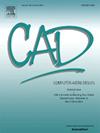非标准机械零件的自监督表示及集成宏观工艺知识的微调方法
IF 3.1
3区 计算机科学
Q2 COMPUTER SCIENCE, SOFTWARE ENGINEERING
引用次数: 0
摘要
在非标机械零件几何复杂性和工艺知识多样性的背景下,传统的结构化数据表示方法不能有效地表达零件的特征。这导致零件检索困难,工艺知识复用效率低。为了解决这一问题,我们建立了一个集成几何结构和宏观过程知识的多层属性图来表示nsmp,并提出了几何相似样本和宏观过程相似样本的生成方法。然后,我们提出了一种基于图卷积编码器的预训练模型来嵌入零件的几何结构,并将其转移到监督分类任务中。此外,进一步介绍了一种结合图池编码器的微调模型,该模型集成了宏过程知识。该方法通过嵌入余弦相似度,使用户能够高效地检索出适合设计和工艺重用的零件,从而提高零件检索和工艺重用的效率和准确性。实验结果表明,预训练模型在嵌入表示和样本分化方面表现优异。具体来说,其在分类任务中的迁移学习准确率达到92.6%。此外,我们将微调应用于宏过程重用,实验确定的相似阈值为0.952,判断准确率为94.1%。本文章由计算机程序翻译,如有差异,请以英文原文为准。
Self-supervised representation of non-standard mechanical parts and fine-tuning method integrating macro process knowledge
In the context of the geometric complexity and process knowledge diversity of non-standard mechanical parts (NSMPs), conventional structured data representation methods cannot effectively express the features of parts. This results in difficulty of part retrieval and low efficiency of process knowledge reuse. To address this problem, we established a multi-layer attributed graph that integrated geometric structure and macro process knowledge to represent NSMPs, and proposed methods for generating geometrically similar samples as well as macro process similar samples. Then, we proposed a pre-training model based on a graph convolutional encoder to embed the geometric structure of parts, which was transferred to supervised classification tasks. In addition, a fine-tuning model incorporating a graph pooling encoder is further introduced, integrating macro process knowledge. This approach enables users to efficiently retrieve parts suitable for design and process reuse through the cosine similarity of embedding, thereby improving the efficiency and accuracy of part retrieval and process reuse. The experimental results show that the pre-training model excels in embedding representation and sample differentiation. Specifically, its transfer learning accuracy in classification tasks reaches 92.6%. Furthermore, we applied fine-tuning to macro process reuse, where the experimentally determined similarity threshold is 0.952, achieving a judgment accuracy of 94.1%.
求助全文
通过发布文献求助,成功后即可免费获取论文全文。
去求助
来源期刊

Computer-Aided Design
工程技术-计算机:软件工程
CiteScore
5.50
自引率
4.70%
发文量
117
审稿时长
4.2 months
期刊介绍:
Computer-Aided Design is a leading international journal that provides academia and industry with key papers on research and developments in the application of computers to design.
Computer-Aided Design invites papers reporting new research, as well as novel or particularly significant applications, within a wide range of topics, spanning all stages of design process from concept creation to manufacture and beyond.
 求助内容:
求助内容: 应助结果提醒方式:
应助结果提醒方式:


